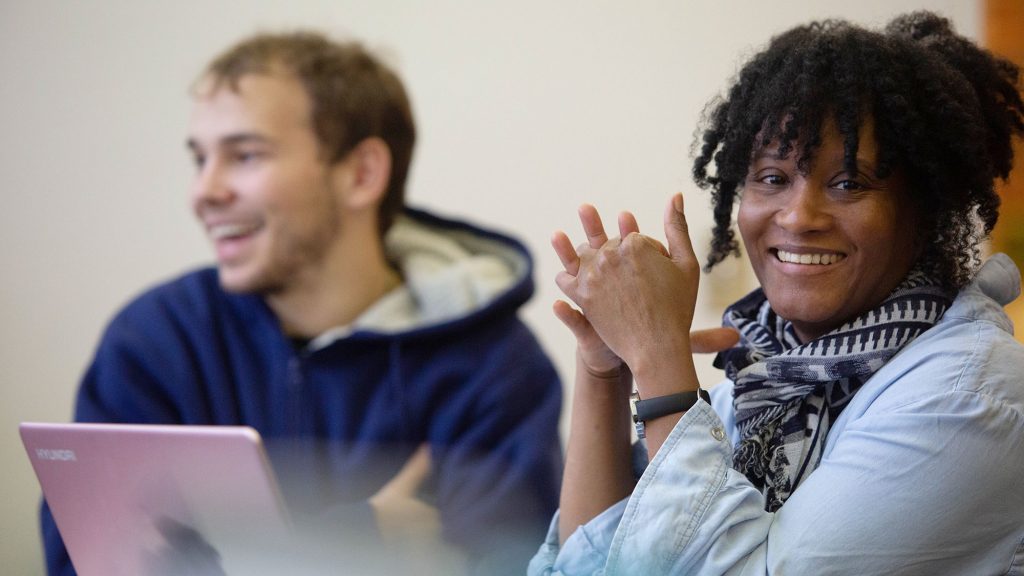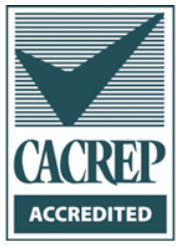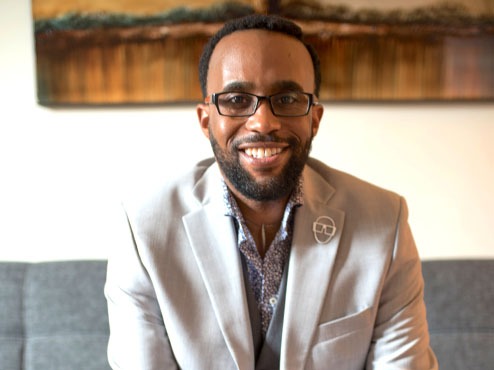Develop skills to help people: Master’s in mental health counseling
The CACREP-accredited MS in Professional Counseling: Clinical Mental Health Counseling Track is designed to transition you into a career in professional counseling and prepare you to become a licensed professional counselor (LPC) in the state of Pennsylvania. The Clinical Mental Health Counseling track will train you to work with children, adults, and families in diverse settings such as schools, hospitals, correctional facilities, and mental health agencies. The program cultivates respect for the uniqueness of individuals and is grounded in social justice and advocacy. It emphasizes a developmental focus across the lifespan and applies scholarship to clinical practice.

Credits required:
60 credits
Cost per credit:
$1,015/credit
Time to degree:
2.5 – 3.5 years
Delivery:
On campus
Mental health counseling degree curriculum
The 60-credit M.S. degree in Professional Counseling consists of 51 credits of core courses, 9 credits of electives geared towards your professional interests, and 700+ clinical hours in counseling. You will tailor your degree by choosing a clinical mental health concentration:
Adult Counseling Concentration
The Adult concentration enhances counseling skills and knowledge needed to support adults in various stages of life while gaining insights into the unique psychological, emotional, and developmental needs of adults and older adults.
PRC 718 – Advanced Counseling Skills
PRC 732 – Human Sexuality
Elective in Counseling, psychology, or social work
Child & Adolescent Counseling Concentration:
The Child and Adolescent concentration is designed for students who wish to work with children and adolescents in a variety of settings: community mental health agencies, school-based mental health counseling, family-based counseling, residential treatment centers, integrative pediatric care, and outpatient counseling. Students will specialize in child-based interventions and get an advanced understanding of assessment and play therapy. Students will also develop an advanced understanding of systemic advocacy and parent consultation to support the development of children and adolescents in their natural environments.
PRC725 – Interventions with Children
PRC749 – Play Therapy
PYM750 – Clinical Assessment of Children and Adolescents or ED 766 Children and the Media
Or School-Based Mental Health Concentration (graduates with 63 credits)
PRC 725 Interventions with Children
PRC 749 Play Therapy
PYM 750 Clinical Assessment of Children and Adolescents or ED 766 Children and the Media
PRC 751 School-Based Mental Health Counseling Field Experience
*Scholarships are available for the School-Based Mental Health Concentration.
Clinical Evaluation Concentration
The Clinical Evaluation concentration offers an opportunity to develop skills in assessing and diagnosing mental health disorders, conducting comprehensive assessments, interpreting diagnostic criteria, and formulating evidence-based treatment plans, providing essential support to individuals seeking mental health treatment.
PYM740 – Trauma Assessment & Intervention
PYM750 – Clinical Assessment of Children
Elective in Counseling, psychology, or social work
Corrections Counseling Concentration
The Corrections concentration involves understanding the complexities of the correctional environment, including the unique psychological and behavioral needs of incarcerated and formerly incarcerated individuals. This concentration focuses on gaining foundational training and skills to work with individuals in the criminal justice system while promoting positive change and reducing recidivism rates.
PYM720 – Foundations of Forensic Psychology or PYM723 – Poverty, Race, Gender in Criminal Justice
PYM721 – Systems of Crime and Justice
PYM722 – Psychology of Deviance
Trauma-Informed Counseling Concentration
The Trauma-Informed concentration involves gaining an awareness of the pervasive impact of trauma on life experiences and relationships in addition to recognizing trauma’s role in the thoughts, feelings, and worldview of individuals who have experienced trauma.
PRC 718 – Advanced Counseling Skills
PRC 719 – Advanced Crisis Management
Trauma-specific elective in Counseling, psychology, or social work
Generalist Concentration
The Generalist concentration is designed as a comprehensive approach to counseling for individuals passionate about making a difference in diverse communities and prepares students for a wide range of professional opportunities. Students can learn more about these programs by speaking with their Faculty Advisor.
9-credits of electives
The child and adolescent concentration for the Clinical Mental Health Counseling degree includes three courses that address specific interventions, assessment and play therapy. If you choose to concentrate on those who have suffered chronic and/or acute trauma in their lives, you’ll receive training in crisis management, trauma assessment and interventions. You can choose the forensic concentration if you want to work in legal or correctional settings, studying the interaction of mental health with the justice system, the roles of practitioners in the legal system and the unique concerns of this population.
Courses Descriptions for the Professional Counseling Program
Quick facts
- 2024 PCA Outstanding Counselor Education Program
- Meet educational requirements for Pennsylvania licensure in professional counseling (LPC) and national counselor certification (NCC)
- Degree program centered around multicultural and social justice
- Scholarships and Graduate Assistantships Available

Clinical Fieldwork Experience
“Professional practice, which includes practicum and internship, provides for the application of theory and the development of counseling skills under supervision. These experiences will provide opportunities for students to counsel clients who represent the ethnic and demographic diversity of their community.” – 2016 CACREP Standards: Section 3
During the practicum and internship experience, you will learn and practice, under supervision, a wide array of duties and responsibilities of a professional counselor who is employed at the site placement. These experiences are developmental in nature, as you grow in your competence, skills, and progress from practicum to internship experiences. Over the course of the clinical fieldwork experiences, you will complete a minimum of 700 clinical hours.
Accelerated Masters of Professional Counseling Program
Accelerated
Fast track your way into this master’s program by taking graduate courses as a Carlow undergraduate student. Course credits count toward both degrees. If you are interested in becoming a professional counselor and you are currently a junior or senior, with a minimum of a 3.0 GPA, consider applying for the Accelerated Masters of Professional Counseling Program. You will be able to take up to four (4) graduate level courses which are held on-campus.
Graduate Courses
PRC 708 Ethics and Professional Orientation
PRC 701 Human Growth and Lifespan Development
PRC 702 Social and Cultural Foundations
PRC 710 Counseling Theories
Accelerated Program – Undergraduate Prerequisite Courses
1) PY 122 Lifespan
2) PY 203 Personality Theory
3) PY 285 Intro to Counseling
4) Any additional 3 credits UG Psychology Course(s)
Contact your Carlow Faculty Advisor for details.
Career opportunities for mental health counseling degree
You can work in schools, hospitals, correctional facilities, community mental health agencies and private practice. Employment of mental health and substance abuse counselors is projected to grow 25% from 2019 to 2029, according to the U.S. Bureau of Labor Statistics.
▸ View the Professional Licensure Disclosure for this program.
Accreditation

The Council for Accreditation of Counseling and Related Educational Programs (CACREP), a specialized accrediting body recognized by the Council for Higher Education Accreditation (CHEA), has granted accreditation to the following programs in the Department of Psychology, Counseling, and Criminology at Carlow University: Addictions Counseling and Clinical Mental Health Counseling through 2029.
The Professional Counseling Program emphasizes high standards of professional competence. The program is committed to its stated mission through ongoing accreditations by the Middle States Commission on Higher Education and the Council for Accreditation of Counseling and Related Educational Programs (CACREP). We emphasize ethical practice and keep current with state and national standards for certification and licensure for practice in clinical practice environments. In addition, we engage in ongoing program development and refinement based on accrediting bodies’ and licensure boards’ developments and recommendations, as well as sensitivity to licensure requirements, and legal and ethical issues.
Additional program information:
- Learn about the program (program description, annual report, mission statements and program objectives)
- Graduate statistics (NCE pass rates, completion rates and job placement rates)
Admission requirements and application process
Sign up for Professional Counseling Recruitment Events
If you are interested in pursuing a career in Professional Counseling by providing individual and group counseling, you can apply for free online. The graduate program admissions process happens on a rolling basis. Our students have undergraduate degrees in a wide array of disciplines from psychology, human services, social work, or other related majors to majors outside of the helping professions.
Apply by
November 1 or April 1
Start terms:
Fall & Spring
Requirements
- Baccalaureate degree from an accredited institution
- Cumulative GPA of 3.0 or higher. A GPA below 3.0 may be reviewed on a case-by-case basis if there is relevant evidence of work history in the helping field, and/or strong grades in upper-level courses (psychology, human services, social work, or other related majors).
- Evidence of work and/or volunteer experience in a helping field
- Evidence of graduate level writing skills necessary for success in a graduate program
- Ability to perform all the program’s essential standards required to practice as a professional counselor
- Ability to demonstrate professional dispositions and behaviors
Process
- Official transcripts from all degree-granting institutions you have attended. Transcripts must be sent directly to the Carlow from the institution(s).
- A written professional essay describing your professional career goals, strengths, and skills that will contribute to your success in a graduate counseling program. Additionally, discuss how you incorporate social justice and diversity in your work. If your GPAs is below 3.0, also include the factors that impacted your GPA. The essay must demonstrate evidence of graduate level writing skills. (2-page limit).
- Current resume or curriculum vitae highlighting education and professional experiences in counseling and/or related field.
- Two letters of recommendation (one from faculty member/academic source & one from employer/volunteer supervisor) that address your professional accomplishments, leadership potential, and ability to succeed in graduate-level work. The references should not be related to the applicant.
- GRE/GMAT scores are not required for admission
Transfer students can transfer up to 9 credits earned at a CACREP-accredited program. International students can find more information on our International Admissions page.
The Professional Counseling Program’s application deadline for Fall semester is April 1st and November 1st for the Spring semester. We will continue to accept applications for review beyond those deadlines; however, preference will be given to those that applied by the designed deadlines. The preferred deadline for full consideration of graduate assistantship opportunities is February 1st.
Once your completed application is received, the program faculty will review your application materials and the selected applicants will be scheduled for an interview. Incomplete applications will not be reviewed. Admission decisions include regular, provisional, and conditional admission to the program.

Committed to diversity and inclusion
Neal Holmes ’18 said his time at Carlow was a great academic experience that transformed his work and how he sees the world as a human being. “I felt welcomed by the staff and students, and I could feel that there was a strong commitment to diversity and inclusion work in the graduate counseling program. I appreciate the university’s commitment to social justice which is so parallel to my work in the counseling field today.”
Professional Counseling faculty

Aniela Scanlon, PhD, LPC, NCC, ACS Assistant Professor
Contact Admissions
If you are interested in this graduate program, our Admissions team is available to help you with the next steps, including scheduling an on-campus visit or attending an upcoming event.
